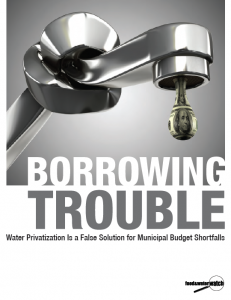Borrowing Trouble: Water Privatization Is a False Solution for Municipal Budget Shortfalls
The 2008 global financial crisis left many governments around the world with serious fiscal challenges. Eroded tax bases and growing health and retirement costs created or worsened local budget deficits across the United States, and a sovereign debt crisis rattled the European Union. Instead of confronting these problems head-on, a number of public officials across the globe sought to lease or sell public water and sewer systems to fund ongoing government functions or to pay down liabilities. That is, they have tried to use water privatization to create the illusion of having balanced the budget, when in fact they are just digging the hole deeper.
See Food & Water Watch’s Report
Water privatization is not a real solution to government financial challenges. It is a one-shot ploy that masks the underlying problems and that delays the hard decisions necessary for real fiscal sustainability. Instead of reducing public bills or mitigating the financial burden on taxpayers, it increases the long-term costs borne by households and local businesses.The 2008 global financial crisis left many governments around the world with serious fiscal challenges. Eroded tax bases and growing health and retirement costs created or worsened local budget deficits across the United States, and a sovereign debt crisis rattled the European Union. Instead of confronting these problems head-on, a number of public officials across the globe sought to lease or sell public water and sewer systems to fund ongoing government functions or to pay down liabilities. That is, they have tried to use water privatization to create the illusion of having balanced the budget, when in fact they are just digging the hole deeper.
The government’s primary objective in these privatization arrangements is to obtain a sizable upfront payment from the company or consortium that takes over the water or sewer system, often as a desperate response to a fiscal crisis. As a consequence, governments usually award contracts to the bidder that offers them the most money, instead of selecting the highest-quality or least-expensive option for households and local businesses.
This money is not free; rather, it should be thought of as a loan. Residents and local businesses will have to repay it, with interest, through their water bills. In a 1997 report about wastewater privatization, the U.S. Environmental Protection Agency said as much: “In summary, any payments a local government receives from the sale or lease of a wastewater infrastructure asset represent a loan from the buyer or lessee which must be repaid with interest by the wastewater users in the form of additional user fees.”



